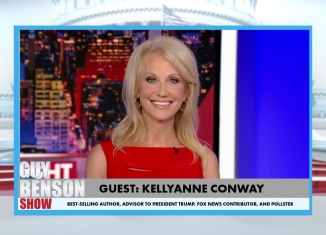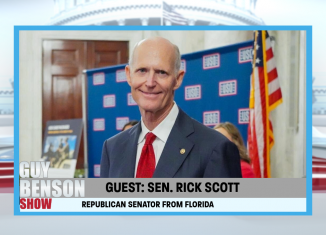Sen. Mitt Romney (R-UT) Blasts White House For Dishonest Math On ‘Build Back Better’ Plan, Says Manchin & Sinema Won’t Go Along With It

Listen To The Full Interview Below:
Senator Mitt Romney (R-Utah) joined the Guy Benson Show to discuss why he supported the passage of the bipartisan infrastructure bill and why he thinks Senators Manchin & Sinema won’t go along with supporting Biden’s ‘Build Back Better’ multi-trillion-dollar spending bill.
Senator Romney slammed the White House for putting out dishonest math to claim the ‘Build Back Better’ plan is fully paid for saying,
“Well, that — that level of dishonesty is not going to sail with the American people. They’re — they — the American people will look at those numbers and they’ll recognize that, in fact, even if you do the accounting the way the Democrats want you to, it’s not paid for. And if you do it honestly, it’s really not paid for. And when I say honestly, it’s this. When they have a program that they put in place and they say it’s going to expire after three years, but then they count as they revenue 10 years of revenue. That’s just not honest. And so, if you take that program and you run it the full 10 years and match it with your revenues over 10 years, then the gap you’re talking about is in the trillions of dollars. So — The — and that — and that’s why I think ultimately you’re going to get people like Joe Manchin and Kyrsten Sinema and they’re going to say, hey, guys, that’s just not honest. We just can’t do it.”
Full Transcript Below:
GUY BENSON, HOST, FOX RADIO: For now we are thrilled to welcome back to the program U.S. Senator Mitt Romney, Republican of Utah. He joins us now. Senator Romney, thank you so much for being here.
SEN. MITT ROMNEY, (R-UT): Happy to join you, Guy.
BENSON: So, Senator, I want to start with yesterday’s bill signing. You were one of the Republicans who attended at the White House, you were one of the Republican Senators who voted in favor of the bipartisan infrastructure bill. From a Republican or a conservative perspective, you’re a fiscal conservative, what are your thoughts behind some of the anger among many conservative Republican voters who are upset with Republicans who voted in favor of this? They think oh you’re handing a victory to President Biden. In the House, they were giving Pelosi the votes that she needed when they were in a real pickle potentially on the with count. What would you say to those critics? Why do you feel like this bill was worthy of bipartisan support, and your support in particular?
ROMNEY: Well, first of all, it was half as much spending on physical infrastructure as President Biden originally proposed. So, we cut back dramatically what he wanted. Number two, it took physical infrastructure away from his other bill, which is the, if you will, the BBB program, which is to dramatically increase spending on social programs. So, in some respects, we took the sweetness away from his overall bill, and I think made it harder for him to get his BBB program through, I certainly hope so. And, of course, most importantly, it allows us to deal with some of the infrastructure needs that we have. A lot of states like mine that are growing fast that need some help on highways, and bridges, and internet, and so forth. So, we’re — overall it’s good for America. Yes, you know, I agree that Democrats will get some credit for it as Republicans will. But it’s — in my opinion, this is good for us, and bad for the Democrats.
BENSON: So, let’s focus on that analysis because I was sort of take it or leave it on the infrastructure bill, I saw both sides of the argument. I did not come on the air and rage against Republicans who thought it was a good idea, I wasn’t fully disagreeing either with those who voted no. I could understand why Republicans might be split on this. And I think it’s OK to sort of see both sides. I was a bit uncomfortable seeing these 13 House Republicans hand every vote needed for Speaker Pelosi to get this through in the lower chamber. However, and I made this point the very next day, and this goes to what you just argued, Senator, what the progressives wanted all along was for the infrastructure bill to be inextricably linked to Build Back Better, to this huge reconciliation spending scheme. And they were able to link them and couple them. For weeks on end, this development has now decoupled those two pieces of legislation. And I wonder if that strategically might actually make the Democrats’ job harder ultimately to get Build Back Better passed into law. Because some of the moderates or at least relative moderates in the House and certainly some of your colleagues in the Senate they helped negotiate the infrastructure bill. They’ve gotten the win there, they might want to take that win and say, you know, maybe let’s pump the brakes on this other stuff. Or maybe let’s water it down and bring down, you know, the tax increases or bring down the spending levels. Some of that progressive leverage that they had is now gone.
ROMNEY: Well, I think it’s hard to precisely calculate what the political implication is of passing a particular piece of legislation. That being said, I agree with your analysis there, which is taking away the physical infrastructure, which Biden wanted as part of a total package, taking that away and making it get voted on independently makes it harder for them to pass all the rest of the stuff, this massive tax increase and the spending on pre-K and childcare and various benefits, it makes it harder to pass that. That doesn’t mean it won’t pass, it just makes it harder. And so, I believe by separating these two we’ve made it harder for the to pass the Build Back Better bill and I think we’ve made it a substantial savings in spending and probably a savings in terms of tax increases as well. So, you know, I — we didn’t — we didn’t vote for it entirely because of the politics, but I can tell you when you see Mitch McConnell vote for something it’s says based upon his calculations he figures the politics are working in our favor and not on the other side’s favor.
BENSON: Yes, I think that’s something that’s important to underscore, because whether you love Mitch McConnell or hate Mitch McConnell, I tend to be in the former category, I’m a big fan of cocaine Mitch, when he has his antenna up and he’s trying to get the lay of the land politically his instincts are often very good. He’s a savvy operator and a great tactician. He’s been doing it a long time. So I think that’s just something to think about if you’re one of the people really up in arms over this vote. But let’s shift now more specifically, Senator, to the reconciliation Democrat spending bill. Trillions of dollars, tons of gimmicks in there to make it seem like it might be a little bit less expensive than it really will be. We see record high, we’re at 31-year highs in inflation, the White House with a straight face every day comes out and says spending these trillions of dollars will help inflation. The president saying no one’s going to see a tax increase unless you’re a rich person making over $400,000 a year. We’ve got non-partisan analysts saying that’s not true. There’ll be tax increases on the middle class here. It just feels like given all of the struggles and challenges facing our economy right now I wouldn’t support this package under any circumstances. It’s way too much spending, way too many tax increases. But especially in this moment it almost feels like madness and yet they are chugging right along and determined to pass it. What are your top reasons that you are so vociferously opposed to Build Back Better?
ROMNEY: Well, first of all, we shouldn’t be raising taxes on the American people, that’s number one. Number two, we shouldn’t be spending a ton of money on things we don’t absolutely need, even as we’re racking up larger and large deficits and adding to the national debt. We simply can’t afford to spend money on things that aren’t absolutely essential. So, this bill spends a whole lot of money on things I don’t like. I wouldn’t vote for any one of them that I know of. And it raises taxes. I mean, it’s bad on both sides and, of course, with all that’s going on with inflation it just adds to the burden that’s carried by the American people and particularly people at the lowest income levels in our society. The people who are having a hard time making ends meet are the people who are looking at their gasoline price go up, their home heating oil price go up, their grocery store bill going up and in many cases these are going up by double-digits. So, when the Democrats tell you, oh, the taxes on people earning under $400,000 aren’t going up, there’s a tax notice inflation and that number is going through the roof.
BENSON: Yes, and the tax policy center, I’ll get into these weeds a little bit later in the show, put out their analysis just the other day saying that middle class income earners will see a tax increases in their actual tax bill, 20 to 30 percent of those households under the House bill. It’s — I mean, it’s — that’s a left-leaning organization that came up with that score. Senator, I just want to touch on something you just mentioned. You feel like this spending is not absolutely essential — that was your term — which is why you feel like especially these days we should not be pursuing anything like that. Shall I infer from that answer that because you favored and voted in favor of the infrastructure bill, you do believe that that spending is in fact essential right now?
ROMNEY: I believe it will add to the dynamism of our economy and it will ultimately help lower the inflationary pressures. Why is that? And that is because when you make rail, and transit and highways more efficient, you get goods to the consumer faster. And by doing that, you — you increase the supply of goods and services. And as a result of that, you lower the inflationary pressures. So it is good for the economy. It gets people not only back to work but it allows people to get their goods and services at a more reasonable cost. So it is anti-inflationary. And I think virtually any economist who’s looked at it said, yes, this will help reduce inflation. It’s paid for that we’re not — we’re not adding to the debt with the — with the bill. And for those reasons, I think it’s essential to get our — get our infrastructure back to — back to the level it should have been. By the way, President Trump when he was in office proposed, I think it was $1.5 trillion in infrastructure spending. He — he opened eyes of a lot of Republicans to the wisdom of adding to our infrastructure in our nation. And that’s simply something which those Republicans that worked on this bill are attempting to do.
BENSON: Last question on this front, Senator. You mentioned the deficit and adding the deficit. In this case, you say the infrastructure bill is paid for. That’s also what the White House is claiming about Build Back Better. Although, there is a “New York Times” report now, unsurprisingly, that even with all the smoke and mirrors and all the gimmicks that they’ve jammed into that reconciliation bill, the White House is now telling congressional Democrats — warning them to brace for a CBO score, from the non-partisan bookkeepers basically on Capitol Hill, that is going to be bad for the Democrats, bad for this Build Back Better bill. It will not be all paid for. In fact, the gap could be hundreds of billions of dollars not paid for. And the report in the “The New York Times” last night says that what the White House is urging Democrats on Capitol Hill to do is to ignore the score from CBO, to disregard that number that they might be coming out with as soon as Friday. What is your reaction to the White House reportedly telling Democrats — and it seems like this is now leadership’s position as well on Capitol Hill for the Democratic Party — if the numbers don’t align, simply ignore them?
ROMNEY: Well, that — that level of dishonesty is not going to sail with the American people. They’re — they — the American people will look at those numbers and they’ll recognize that, in fact, even if you do the accounting the way the Democrats want you to, it’s not paid for. And if you do it honestly, it’s really not paid for. And when I say honestly, it’s this. When they have a program that they put in place and they say it’s going to expire after three years, but then they count as they revenue 10 years of revenue. That’s just not honest. And so, if you take that program and you run it the full 10 years and match it with your revenues over 10 years, then the gap you’re talking about is in the trillions of dollars. So —
BENSON: Right, exactly.
ROMNEY: The — and that — and that’s why I think ultimately you’re going to get people like Joe Manchin and Kyrsten Sinema and they’re going to say, hey, guys, that’s just not honest. We just can’t do it.
BENSON: Senator Romney, you know a thing or two about the Olympics, especially the Winter Olympics if I recall correctly. I saw one of your tweets earlier in response to reports that the Biden administration is preparing to announce a diplomatic boycott of the Beijing Olympics next year — different from a full buycott from the United States, a diplomatic boycott. This is a move that you’ve been advocating for a while. Explain why, if you would?
ROMNEY: Well, I think it’s critical for us to make very clear to the people in China, but in particular the people throughout the world and here in our own country that a nation like China, which is carrying out genocide against a million of its own citizens is also persecuting other minorities, brutalizing people in Hong Kong, threatening the people in Taiwan – this is not a place that should be hosting the Olympics. We’re a little late to change the venue where the Olympics are going to be held, I don’t want to make our athletes not be able to compete, they’ve prepared their lives to go to these games. But we should not be sending any diplomats there, and so I am very insistent that the administration agrees we’re not going to send our ambassador there, we’re not going to send a delegation from the U.S. We are not going to show up to Beijing. But, I must admit, I’m looking forward to hearing the United States National Anthem played in China when American athletes beat the rest of the world.
BENSON: Senator Romney, last question, we are just about a week out from Thanksgiving, we’ve been asking some of our guests about this in the last couple days. Thanksgiving happens to be, fun fact, my favorite holiday because it’s sort of kicking off the holiday season – I also love Christmas, of course. Is there a specific tradition in the Romney family that is maybe unusual or particularly meaningful to you for Thanksgivings?
ROMNEY: We start off the day with our own football game. And living in Massachusetts as we did for 40 years, it was typically cold on Thanksgiving. The whole family goes out and – well, I should say all the guys go out – the girls sometimes, but not all of them usually, and we have a game of football. And then we come home and watch the NFL, and then it’s getting time for dinner.
BENSON: You’ve got a pretty big family, so can – you could like do full 11 on 11 maybe?
ROMNEY: I think we’re getting to that point. I’ve got 25 grandkids at this point, so we’re –
BENSON: Wow.
ROMNEY: – going to be expanding the roster.
BENSON: Well, Happy Thanksgiving in advance to you, and Ann, and the whole Romney clan out there in Utah and elsewhere. It’s great to talk to you, Senator Romney, here to kick off the show on this Tuesday. We appreciate your time as we always do.
ROMNEY: Thanks, Guy, good to be with you.
BENSON: Mitt Romney, Republican Senator from Utah.







